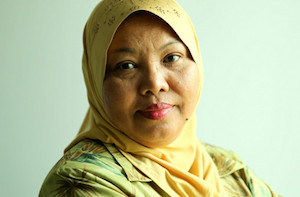Is Hadi really under siege?
The issue is not PAS president Datuk Seri Abdul Hadi Awang’s contribution towards developing PAS today, but more about whether he is the best to lead PAS into the future with Pakatan Rakyat.
Zubaidah Abu Bakar, The Rakyat Post
NOISES in PAS are reaching higher decibels these days as party divisions begin nominating candidates for internal elections in June.
And the most popular topic in discussion is none other than the leadership of party president Datuk Seri Abdul Hadi Awang.
Hadi’s leadership, or the alleged lack of it, became a very hot issue within and outside PAS after the party’s Kota Baru division nominated party vice-president Datuk Tuan Ibrahim Tuan Man for the presidency.
Not that there has never been talk about changing of guard prior to this.
It appears there is an increasing chorus within the Islamist party calling for a change in leadership although Hadi did get one nomination from Shah Alam division thus far.
Even so, the division remains split in its choice of nominee as Hadi only garnered six votes more than the proposed challenger, former party vice-president Ahmad Awang, who managed 72 votes to Hadi’s 78 when put to a vote.
Many had expected Shah Alam to nominate someone other than Hadi for the president’s post; and PAS insiders attributed the outcome to Hadi’s column entitled “Erti wala’ dan kemenangan” (“The meaning of loyalty and victory”) that appeared on the party’s online organ Harakahdaily a day before the Shah Alam annual general meeting.
The party president did not make any comment, only extract verses from three chapters or surah from the Quran related to title.
Although two other divisions — Kota Baru and Kota Tinggi — had nominated other leaders for the party’s No. 1 post while more divisions are said to be contemplating a similar move soon, there is still no clear indication of a wave against the Marang MP at this point.
Moreover, Tuan Ibrahim, a highly respected ulama in the party, had declined the nomination by Kota Baru division, saying he was not worthy to take on Hadi and instead urged party members to continue to support Hadi, in line with the party’s adoption of the concept of Kepimpinan Ulama.
Newly-appointed party spiritual leader Datuk Dr Haron Din, who heads the influential Majlis Syura Ulama, and his deputy, Datuk Ahmad Yaakob, also want Hadi to continue at the party’s helm and called for a no challenge against Hadi.
Another division, Kota Tinggi, also did not want Hadi to lead PAS, nominating vice-president Datuk Husam Musa, a non-ulama as president instead.
This is the second time Husam had received a nomination for the top party post; he was nominated to contest the presidency by the Bukit Bintang division in 2011 but rejected the nomination as he, at that time, said he did not habour any intentions to be pitted against Hadi.
Parit Sulong and Batu Sapi, which also completed their AGM, had decided to let their committee to nominate and the nominee is also unlikely to be Hadi.
This crisis in PAS had also taken a new twist with the Batu division declaring it was distancing itself from the party’s central leadership; the division had taken the action of mufarakah — disassociating with the leader but remaining in the group.
Seventeen out of its 25 committee members had resigned in protest of Hadi’s failure to resolve the internal crisis, ahead of the party’s Muktamar.
Hadi has never been challenged since taking over the party’s helm in 2002 after the death of Datuk Fadzil Mohd Noor, but the nomination of others for his position could also mean there is a relatively strong undercurrent for a leadership change.
He and the Geng Ustaz in PAS have to at least acknowledge that there is dissatisfaction within the party towards his leadership.
The reality is that Hadi had led a big reform in PAS and despite countless complaints of his leadership style, especially among the more progressive party leaders and members, he continues to get the backing of the pro-ulama faction in PAS.
Only a handful of leaders linked to the professionals or reformists in PAS are vocal in wanting a change of leadership, which they said is necessary for continuous relevancy under the present political climate.
PAS, according to this faction, needs a leader who is more committed towards the federal Opposition pact Pakatan Rakyat, which Hadi obviously lacks.
Hadi is hard to beat in terms of his Islamic religious standing. He is popular among Muslim world leaders and commands equal respect of renowned Islamic religious scholars.
As the deputy president of the World Ulama Organisation, of which Islamic scholar Dr Yusof Al-Qardawi is president, he is playing a prominent role during the 3rd International Forum for Ummah Solidarity to be held at his home-base in Rusila, Teregganu, this week and this will in some ways raise his profile.
The issue is not Hadi’s contribution towards developing PAS today but more to whether he is the best to lead PAS into the future with Pakatan Rakyat.
Whether this “say no to Hadi” move will be translated into more nominations of challengers to Hadi, and eventually a contest that is unprecedented in the 63-year-old party, is too early to tell.
The majority of PAS divisions, including in Terengganu, will only be holding their AGMs in April.
Nominations for the central party leadership will be closed on April 30 while elections had been scheduled at the 61st PAS’ Muktamar or general assembly from June 4-6.
It is interesting to see where their support will go.


